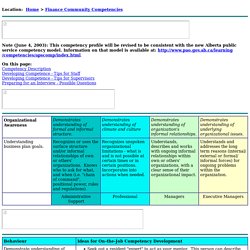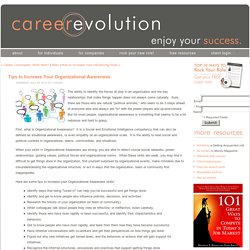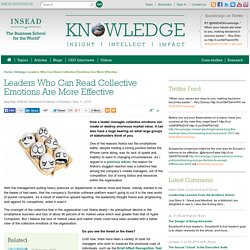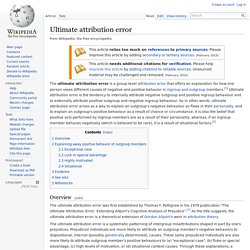

Competency Profile - Organizational Awareness. Location: Home > Finance Community Competencies Note (June 4, 2003): This competency profile will be revised to be consistent with the new Alberta public service competency model.

Information on that model is available at: On this page:Competency DescriptionDeveloping Competence - Tips for StaffDeveloping Competence - Tips for SupervisorsPreparing for an Interview - Possible Questions Describe the culture of your organization and give an example of how you work within this culture to achieve a goal. Describe the things you consider and the steps you take in assessing the viability of a new idea or initiative. Tips to Increase Your Organizational Awareness. The ability to identify the forces at play in an organization and the key relationships that make things happen does not always come naturally.

Sure, there are those who are natural "political animals," who seem to be 3 steps ahead of everyone else and always are "in" with the power players and up-and-comers. But for most people, organizational awareness is something that seems to be a bit nebulous and hard to grasp. First, what is Organizational Awareness? It is a Social and Emotional Intelligence competency that can also be defined as situational awareness, or even empathy on an organizational scale.
It is the ability to read social and political currents in organizations, teams, communities, and situations. When your skills in Organizational Awareness are strong, you are able to detect crucial social networks, power relationships, guiding values, political forces and organizational norms. Leaders Who Can Read Collective Emotions Are More Effective. How a leader manages collective emotions can create or destroy enormous market value.

It can also have a huge bearing on what large groups of stakeholders think of you. One of the reasons Nokia lost the smartphone battle, despite holding a strong position before the iPhone came along, was its lack of speed and inability to react to changing circumstances. As I argued in a previous article, the reason for Nokia’s sluggish reaction was a collective fear among the company’s middle managers, not of the competition, but of losing status and resources within the organisation.
With the management putting heavy pressure on departments to deliver more and faster, nobody wanted to be the bearer of bad news; that the company’s Symbian software platform wasn’t going to cut it in the new world of pocket computers. As a result of selective upward reporting, the leadership thought Nokia was progressing well against its competitors, when it wasn’t. Do you see the forest or the trees? Allan Leighton on the CEOs Radar.
Have Allan speak at your offices!...

Allan is one of the best speakers in the... Have Allan speak at your offices!... Allan is one of the best speakers in the world. Sometimes he's willing to speak at organizations. As all of Allan's proceeds go to Breast Cancer Care we don't charge any commission. Allan started his career in Mars Confectionery as a Salesman in 1974. In November 2000 he left Asda and developed a new work ethic – ‘Going Plural’ – as he took on non-executive positions in a number of companies including lastminute.com, Dyson Ltd, Cannons Group Ltd, Bhs Ltd, BSkyB Group plc and Selfridges & Co.
Allan joined the Royal Mail as company Chairman in 2002, whilst in post he drove a period of modernisation that has transformed Royal Mail from loss making into a profitable business. Allan was President of Loblaw Companies ltd from April 2008 and has acted as a Consultant to George Weston Ltd (Holding company of Loblaw) since 2000. More information: www.onleadership.co.uk. Ultimate attribution error. The ultimate attribution error is a group-level attribution error that offers an explanation for how one person views different causes of negative and positive behavior in ingroup and outgroup members.[1] Ultimate attribution error is the tendency to internally attribute negative outgroup and positive ingroup behaviour and to externally attribute positive outgroup and negative ingroup behaviour.

So in other words, ultimate attribution error arises as a way to explain an outgroup's negative behaviour as flaws in their personality, and to explain an outgroup's positive behaviour as a result of chance or circumstance. It is also the belief that positive acts performed by ingroup members are as a result of their personality, whereas, if an ingroup member behaves negatively (which is believed to be rare), it is a result of situational factors.[2] Overview[edit] The ultimate attribution error is a systematic patterning of intergroup misattributions shaped in part by one's prejudices.